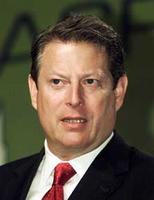
Increasingly, the problem - for potential 2008 Democratic candidates - is defined as "beating Hillary" rather than merely "winning the nomination."
In the current issue of The New Republic (free subscription), Ryan Lizza makes the compelling argument that only Al Gore can beat Hillary Clinton.
But a Hillary v. Al race would have a schizoid affect on voters such as myself. The desire for a woman (feminist) president would be pitted against the desire for a genuinely leftist president.
There would also be the desire to right a wrong, which a campaign by Al Gore would certainly provoke.
In such a race, I'd be forced to vote for the 'genuinely leftist' candidate, but it's also highly likely that a challenge by Al Gore would force Hillary Clinton to move left. That could get really interesting.
Those who've recently gone on record with the view that a run by Gore is "never going to happen," should pay close attention to Gore's own words in the final paragraph below.
WHY ONLY GORE CAN BEAT HILLARY
Al Gore is back in the news. In the last few weeks a boomlet of commentary has Democrats whispering--or wishing--that he is considering a run for president in 2008. The New York Post argues that Gore "is suddenly re-emerging as a vocal and visible Bush-basher" and sees a recent Gore fundraiser for the DNC as evidence he's eyeing the '08 race. U.S. News & World Report says, "Gore friends see his recent political and business moves as proof he's preparing to run." Arianna Huffington reports from California that "more and more, the Hollywood buzz is centering on Al Gore."
In a round of calls with Democratic strategists, I could find few signs that Gore is doing much of anything to ready himself for a presidential run. But what I did find is that many Democrats think there is a powerful case for Gore to get into the race. In fact, Gore may be the only Democrat who can beat Hillary Clinton.
Clinton's strengths in the primaries can't be exaggerated. She comes to the race with all of the benefits that historically accrue only to sitting vice presidents. She has built the most extensive fundraising network in Democratic politics. Her name recognition and star-power assure her the top spot in every early poll. Among Democratic women and African Americans, two key constituencies in the primaries, Hillary has a level of cachet that the current crop of likely challengers will find impossible to match.
These enormous advantages have allowed Hillary to make moves geared far more to the general election than to the primaries. She has been a steadfast hawk on Iraq, and she has searched for common ground with the right on abortion. She has organized a series of policy photo-ops with erstwhile conservative enemies like Newt Gingrich and Sam Brownback.
But these same moves, hailed by pundits and Democratic strategists as brilliant politics, have also planted the seeds for her undoing. . In Democratic circles the conventional wisdom is that Hillary can't lose the nomination but can't win the general election.
When asked recently about taking another shot at the presidency, Gore said the following: "I have absolutely no plans and no expectations of ever being a candidate again. ... I don't completely rule out some future interest, but I don't expect to have that." That is far short of ruling out a run. In fact, the beauty for Gore is that, unlike a little-known governor or senator who needs to feed the idea that he may run for president, Gore has no interest in looking ambitious. The ideal situation may be for him to hang back for the next year and a half, let the field sort itself out and wait for Democrats to become bored with the pack of candidates trying to dethrone Hillary. That would allow him to enter the race with the moral and political authority of a reluctant draftee. Every primary season goes through such a period of boredom, a time when voters and pundits scour the country for fresh blood. That could be Gore's moment.
Al Gore Hillary Clinton Election 2008 Politics Democrats Gore Hillary Tennessee 2008 2000